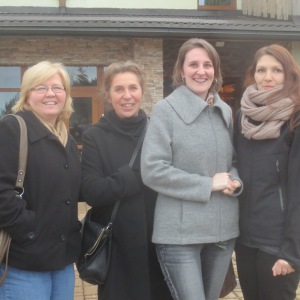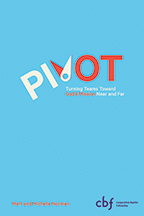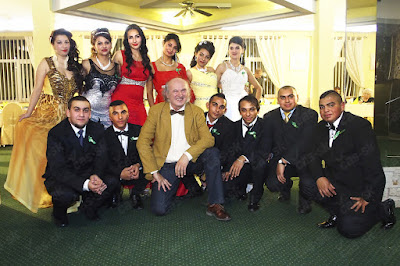This post originally appeared on CBF's Blog in a series highlighting ministries supported by the Offering for Global Missions.
Support from the CBF Offering for Global Missions enables us to concentrate on nurturing long-term relationships in local communities. These relationships are not built on promises of long-term funding. We receive no ministry funds from the Offering. What we do receive is funding for our presence – which includes not only living in Slovakia but also provides for us to be able to travel when needed to visit with our local partners.

Dianne McNary (far left) and Danka, Viera and Mina – women from the Jekh Drom nonprofit in Vazec, Slovakia.
Sometimes we have to visit often and over many months or years. Joining in ministry and learning to deal with one another’s cultural baggage takes time and patience. The Offering provides us with the hallowed space to engage with partners in a community at the pace of our host culture. This is an immeasurable gift.
Long-term sustainability is enabled by a long-term presence.
Should one of the predictions of the imminent end of the world prove true – Jesus’ return, if thatperson is elected president, World War III, or One Direction’s Reunion Tour – we know that we will be safe, living happily in Slovakia for another twenty years. They say that’s how far behind the times we are here. Without testing the end times’ theory, it is true that time here moves at a different pace.
In 2013, we set a goal to assist one local partner establish a preschool for Roma children. As we formed a plan to coordinate our work together, it was clear that the only way forward in the future would be for the Slovak organization to have a building. Within just a few months of beginning the project with them, we had generous sponsors from across the Fellowship who agreed with the vision of the Slovak group and wanted to support them in either purchasing or building a new building.
Because the CBF Offering for Global Missions provided us with time to study language and culture, because the Offering provided for our stable presence in Slovakia and because of the faithfulness of individuals and churches who generously gave more than their support for the Offering into a project to buy the building we were ready to keep up our part of the partnership agreement with the local Slovak organization. The Americans responded relatively quickly and sacrificially. Then we entered Slovak time.
Believe me, we would have preferred to move the process along more quickly! Culturally and missiologically, however, we knew this would be a mistake. If the building was to be theirs, they had to decide what was appropriate. We had to wait, though not always patiently, for them to act.
Thankfully, the American donors were willing to stay in relationship with the Slovaks throughout this process. Almost three years after we began the project and two years since we had the funds available, we were able to celebrate with our local partners when they purchased a suitable building!
Engaging in long-term cross-cultural missions is an investment in the Reign of God where the results may never be fully known. We have been blessed to have hosted many short-term ministry teams in the twelve years we have been fully funded by the Offering.
We remind teams that God’s story has been unfolding in Slovakia for at least 1,200 years (to hear the rest of the story, you have to join a team!). A short-term team or even our long-term presence does not introduce God to this place. Lest we be tempted to speak of amazing numbers of conversion stories and Reign of God breakthroughs, we do not seek quick decisions or quick-fix solutions. Instead, the Offering allows us to live in the sacred now, building community-honoring, healthy relationships, and seeing how God moves through different cultures to achieve God’s ends. This is, indeed, an immeasurable gift and an amazing opportunity.
 Immanuel--God with us—is mirrored in the traditional Spanish manger
scenes. The baby Jesus is born in Spanish mangers and other traditional Spanish
buildings. He is surrounded by Spanish farm animals: sheep, goats, but also
pigs and chickens.
Immanuel--God with us—is mirrored in the traditional Spanish manger
scenes. The baby Jesus is born in Spanish mangers and other traditional Spanish
buildings. He is surrounded by Spanish farm animals: sheep, goats, but also
pigs and chickens. 











































